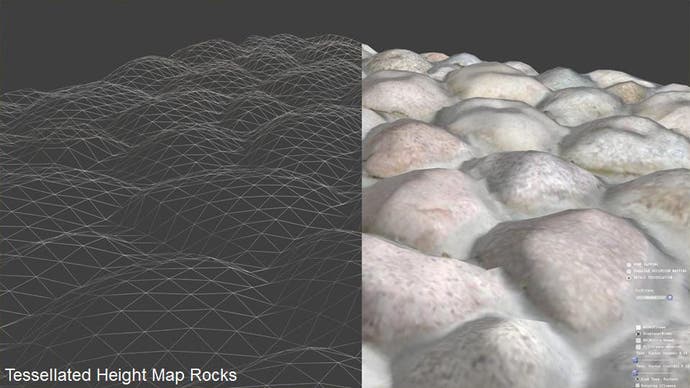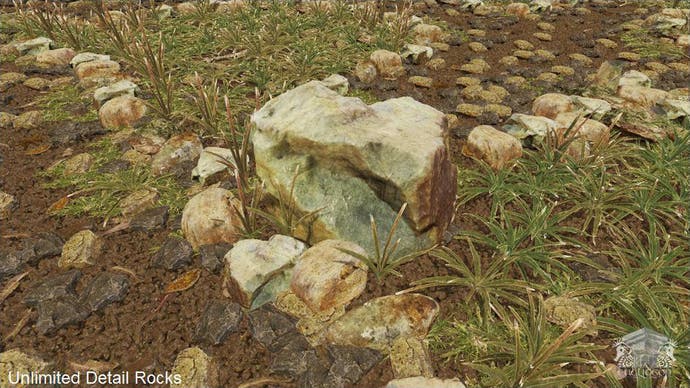Digital Foundry vs. Unlimited Detail
The devil's in the detail.
And this is the main issue we have with Unlimited Detail at the moment. There are known problems with the implementation of voxel technologies and most of the issues are present in the Euclideon demo. The company claims it's doing something new and exciting, and while the demo is acknowledged - even by Notch - as impressive in many ways, the applications within the gaming arena have yet to be proven. Bruce Dell's responses to questions that would clear up these issues are by turns evasive, somewhat defensive and either intentionally or unintentionally comedic.
Some of the discussion being generated by this in the development community is intriguing though. Not everyone is going straight for the jugular on the merits of the demo, but again, the same questions are being raised that we attempted - and failed - to get answers for.
"The geometry quality is excellent in these videos. With professional artists and better lighting and image post processing systems they could easily exceed the current game graphics quality in small static environments," observes Trials HD's Sebastian Aaltonen.
"However since they do not mention anything about their 'revolutionary' data compression algorithm, I am quite sceptical how this technology could be used in a real game. A single high quality point cloud rock can be over 100 megabytes of data. Polygons combined with displacement maps (tessellation for low frequency detail, and pixel displacement techniques for high frequency detail) offer very high compression ratio compared to high polygon meshes (and point/voxel data). Displacement maps are also very easy to stream in and out of memory (virtual texturing or any other existing texture streaming technology can be used)."
In line with John Carmack's comments, it all seems to point to voxel-based technology of some description only finding a home on next-gen consoles, but Bruce Dell takes issue with that.
"Firstly I'd like to say that I greatly respect John Carmack. In light of the fact that we haven't released real-time demos, his statement is sensible, sane, reasonable, but incorrect," he says.
"We have too much respect for Mr Carmack's contributions to the 3D graphics industry to speak negatively of him and understand his comments in the light of the graphics systems he is aware of."


In putting this article together, we were hoping that Euclideon and Bruce Dell might like to take the opportunity to promote the technology, especially as game developers are a component of our audience. To that end, we consulted technical personnel from the games industry who've worked on many high-profile multi-platform games and framed our questions based on their input. While Dell himself comes across as a friendly, humorous guy, the lack of any real technical detail at all in his responses was disappointing.
We put it to him that we were posing the questions potential customers for his technology would be asking and suggested that his answers would only polarise opinion on Unlimited Detail still further, and invited him to expand on his responses.
"I know this might sound strange but at this time we aren't actually trying to get great attention or credibility until our product is finished," Dell says.
"Our intention was to put a little video on YouTube to tell our fans and supporters what we had been doing this year - we never expected it to get 1.5 million views in three days. The negative scam sentiment surprised us at first, but then we realised it probably helps... When we are finished and release real-time demos perhaps there are some points for us in the fact that so many people were wrong about us."
Dell reckons that his technology is being pigeon-holed in the context of existing paradigms, and he believes it's something completely new that industry experts simply do not understand. We went into this expecting a technical discussion but for whatever reason, Bruce doesn't really want to talk about Unlimited Detail on those terms.
"I think the tech community are asking [if it's] a voxel system, a splat system, or ray-tracing and are trying to get enough info to box us as something known. The fact that it's not any of those systems and doesn't resemble any of those systems isn't the answer people are looking for and I am not about to try and hand over all our secrets at this point in the project," he says.
We asked Bruce Dell what stands in the way of getting the technology into the hands of game-makers and what's left to complete.
"I'd like to answer that, but I know that anything I say, regarding what we're still working on, there will be people who point and say 'Ha! They are still working on it, it's not finished! It will never be finished!' and do the dance of joy rejoicing in our interpreted destruction."
The full interview with Bruce Robert Dell can found on GamesIndustry.biz.
